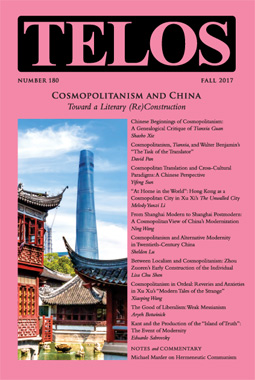Melody Yunzi Li’s “‘At Home in the World”: Hong Kong as a Cosmopolitan City in Xu Xi’s The Unwalled City” appears in Telos 180 (Fall 2017), a special issue on Cosmopolitanism and China. Read the full article at the Telos Online website, or purchase a print copy of the issue in our online store.
 Hong Kong is unique for its hybrid nature in language and culture. Drawing upon Ulf Hannerz’s model of cosmopolitans and locals, this paper argues that Hong Kongese are cosmopolitans and locals in one, other than the dichotomy raised by Hannerz. The paper considers how Xu Xi’s novel The Unwalled City questions any overarching or simplified understanding of cosmopolitanism and its utopian parlance of seamless linguistic-cultural coexistence. For Xu Xi, writing in English provides a crucially literary tactic with which to construct her multiple ethnic identities and eclectic images. The novel The Unwalled City spans from 1993 to 1997 in the city’s run-up to the handover. I examine the characters and their spoken vernaculars as symptomatic of a hybrid literacy and multilingual literary citizenship that mark a distinctly Hong Kong cosmopolitanism. Particularly, the coalesced linguistic registers and diverse tongues as featured in the novel—a mix of standardized English, Cantonese dialect, and spoken Mandarin—show how Xu Xi plays around with the linguistic interplay of hegemony and marginality, negotiation and resistance, the local and foreign, as exploited by the city’s diverse communities and multiethnic citizens. Hong Kong is read as an “unwalled city,” i.e., a city without national and linguistic-cultural boundaries. Hong Kong cosmopolitanism is an essential means by which Hong Kongese and their affiliated “global citizens” articulate the city’s hybridity and cosmopolitic-linguistic creativity. However, Hong Kongese’s fantasies of being at home everywhere in the world also suggest that nowhere is home to them in reality.
Hong Kong is unique for its hybrid nature in language and culture. Drawing upon Ulf Hannerz’s model of cosmopolitans and locals, this paper argues that Hong Kongese are cosmopolitans and locals in one, other than the dichotomy raised by Hannerz. The paper considers how Xu Xi’s novel The Unwalled City questions any overarching or simplified understanding of cosmopolitanism and its utopian parlance of seamless linguistic-cultural coexistence. For Xu Xi, writing in English provides a crucially literary tactic with which to construct her multiple ethnic identities and eclectic images. The novel The Unwalled City spans from 1993 to 1997 in the city’s run-up to the handover. I examine the characters and their spoken vernaculars as symptomatic of a hybrid literacy and multilingual literary citizenship that mark a distinctly Hong Kong cosmopolitanism. Particularly, the coalesced linguistic registers and diverse tongues as featured in the novel—a mix of standardized English, Cantonese dialect, and spoken Mandarin—show how Xu Xi plays around with the linguistic interplay of hegemony and marginality, negotiation and resistance, the local and foreign, as exploited by the city’s diverse communities and multiethnic citizens. Hong Kong is read as an “unwalled city,” i.e., a city without national and linguistic-cultural boundaries. Hong Kong cosmopolitanism is an essential means by which Hong Kongese and their affiliated “global citizens” articulate the city’s hybridity and cosmopolitic-linguistic creativity. However, Hong Kongese’s fantasies of being at home everywhere in the world also suggest that nowhere is home to them in reality.



